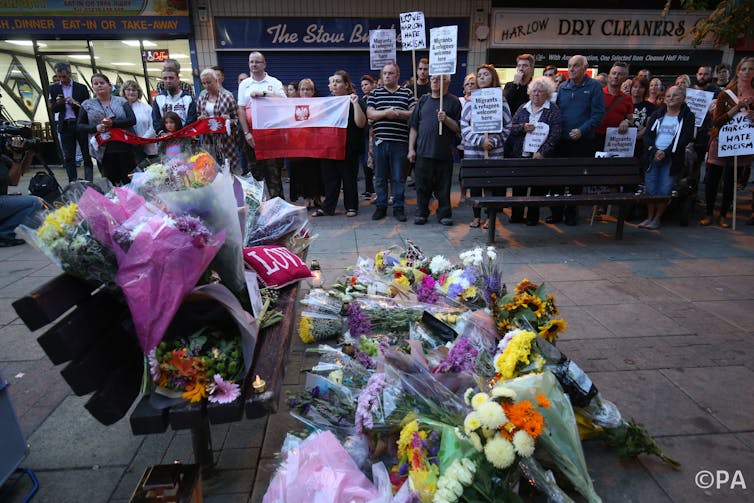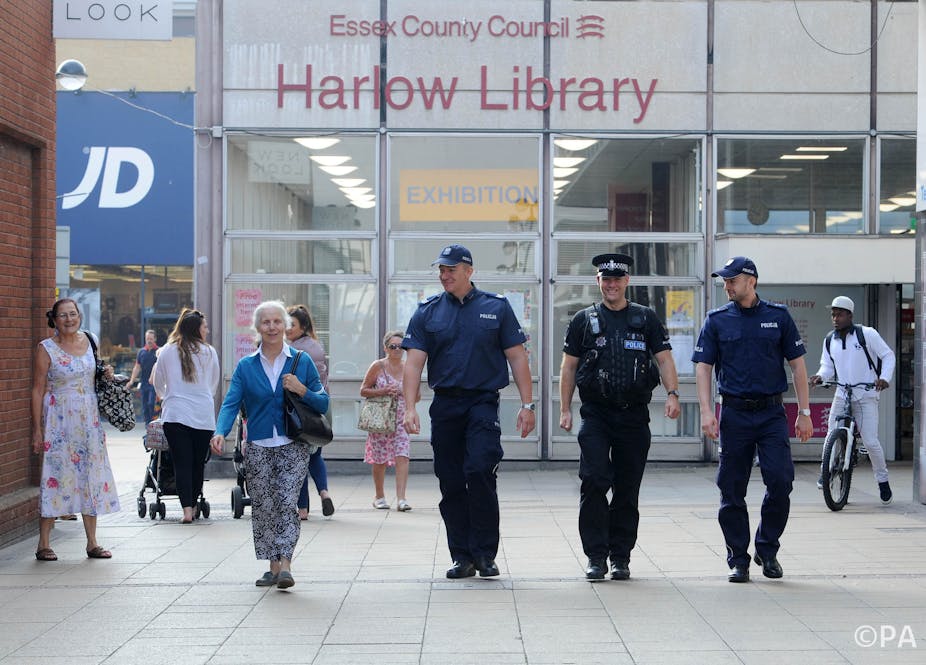The arrival of two Polish police officers in Harlow to patrol with Essex Police is certainly an unusual step. The move comes after a Polish resident, Arkadiusz Jóźwik, was killed and another Pole injured when they were attacked after leaving a pub in late August. Six teenagers were arrested and bailed in connection with the incident, which police said they were investigating as a suspected hate crime.
Two other Poles were later reported to have been attacked in the town in another incident. So what should we make of these events and the police response?
Harlow is a fascinating place. In some ways a slightly jaded new town, it remains optimistic and very much open for business. It has also always been open to new communities and has one of the more diverse populations in Essex, even though the rate of change in the population until recent years was relatively low. It does, however, have the highest crime rate per head of population in Essex and some pronounced social challenges.
Figures from Harlow Council show the 2011 census recorded a total of 4,284 non-British “white” residents living in Harlow, 5.3% of the population. But in 2013 alone, 1,430 Poles with a Harlow address sought new National Insurance (NI) numbers. These were among the nearly 4,000 new NI numbers issued to Harlow residents from European countries that year. These won’t precisely indicate new immigrants into Harlow but they do suggest a rapid increase in the Polish population which is likely to have continued since. Harlow has not been used to that rate of change.
Dealing with suspected hate crime
Hate crime in general is sadly not new to Harlow, but nor is it a prolific problem. Most crime in the area is relatively low-level crime such as theft, robbery, burglary, vehicle offences and unfortunately, domestic abuse. An arson attack on a mosque in 2013 rightly attracted publicity and local condemnation. Yet the number of racially or religiously aggravated crimes recorded in Harlow fell from 83 in the year to March 2015, to 55 in the year to March 2016.
The police face a particular problem in dealing with crimes that might appear to be hate crimes – especially ones that attract publicity. To investigate properly they must not jump to any conclusions, while also not alienating those who feel aggrieved. Essex Police will be working to reassure an unsettled community, and when tensions are increasing they have to police firmly but sensitively. All their actions will be watched, with some on both sides too ready to criticise.

They already have experience of just how difficult this can be. In June 2014 a student at the University of Essex, Saudi national Nahid Almanea was murdered. It was a dreadful and high-profile crime that many started to suggest may have been a hate crime even though similarities with the murder three months before of James Attfield suggested otherwise. The police kept an open mind about motives and stuck to the task of investigating two murders, eventually catching and convicting James Fairweather as he prepared for a third attack. They had stopped a serial killer of random victims. Then, as now in Harlow, reassuring the victims’ communities was crucial.
Collaborative approach
The recent attacks reported in Harlow and elsewhere, as well as anecdotal evidence from the Polish community, do suggest that a growth in hostility comes from some of those opposed to immigration. For Essex police and all other police forces this will be an unwelcome diversion as they grapple with other priorities – a point outlined in a new report by the Police Foundation. Tackling hate crime may well be in many police and crime commissioners’ plans, but hate crime of this particular sort will not have been predicted before the Brexit vote.
Seeking support from the Polish police makes good sense. The Essex initiative is not unique: the Metropolitan Police are reported to have two Polish officers working on attachment in London. Other forces have previously invited officers from Eastern Europe to work here with teams tackling organised crime groups. If their presence now in Harlow can reassure communities, possibly open up new channels for the flow of information, and help interpret – in the broadest sense – the mood of the community, then innovation of this sort is welcome.
Police inquiries are continuing into Jóźwik’s death. It would be good to make sure that the full facts of the attack can become known quickly – then the rebuilding can begin. But sadly the wheels of justice can turn very slowly and in the meantime, the constructive local political leadership which has already been shown must continue to offset the tensions that have mounted during the summer. These may grow yet further, as will the policing challenges, as the difficult negotiations on our future relations with Europe continue.

